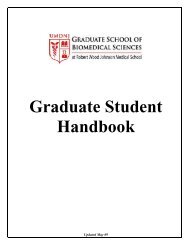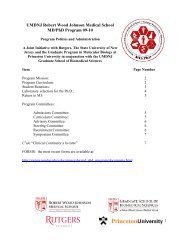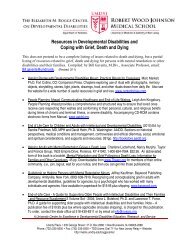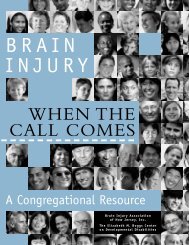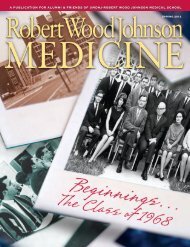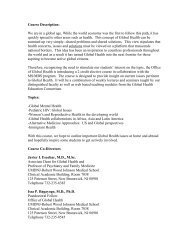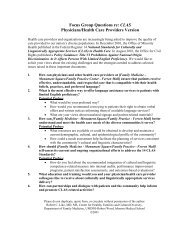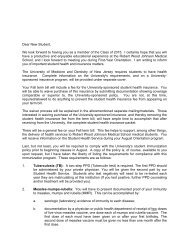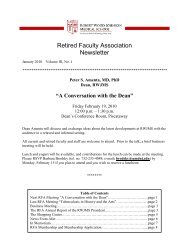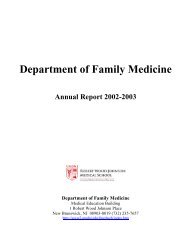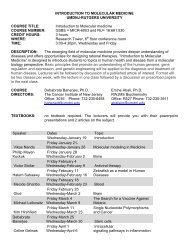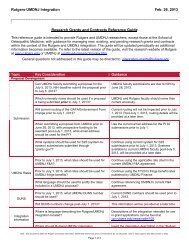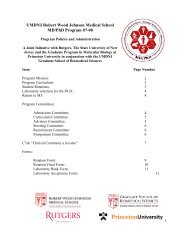Robert Wood Johnson Medicine • Spring 2011 • Population Science
Robert Wood Johnson Medicine • Spring 2011 • Population Science
Robert Wood Johnson Medicine • Spring 2011 • Population Science
Create successful ePaper yourself
Turn your PDF publications into a flip-book with our unique Google optimized e-Paper software.
Volunteer Profile<br />
F a c u l t y<br />
M e m b e r<br />
J. Thomas Davidson, MD,<br />
Clinical Associate Professor of Surgery:<br />
Four Decades of Leadership<br />
in Surgical Training<br />
By Kate O’Neill<br />
Davidson, MD<br />
clinical associate professor<br />
J.Thomas<br />
of surgery, has been<br />
involved in the training of general<br />
surgical residents since 1974.<br />
That was the year he moved to<br />
Princeton and joined Princeton<br />
Surgical Associates. Freshly graduated<br />
from a fellowship in vascular<br />
surgery at NYU-Bellevue Hospital<br />
Center, Dr. Davidson hoped to join<br />
an established, successful surgical<br />
practice in a university town with<br />
easy access to New York City. He<br />
knew about Princeton University.<br />
But not until he interviewed at<br />
Princeton Surgical Associates did<br />
he learn about the proximity of<br />
Rutgers Medical School.<br />
The medical school had just<br />
signed an agreement with the<br />
University Medical Center at<br />
Princeton (UMCP) as an affiliate<br />
training site for the general surgical<br />
residency. When the chair of the<br />
Department of Surgery at UMCP<br />
asked Dr. Davidson to organize the<br />
program in Princeton and serve as<br />
liaison to the medical school, he<br />
gladly took on the job.<br />
He initially served as assistant<br />
site director and assumed the<br />
directorship when he became chair<br />
of the Department of Surgery at<br />
UMCP 18 years ago — and he has<br />
continued as director even after<br />
stepping down from the chair position<br />
last year. “It was serendipitous<br />
for me that this need came up just<br />
as I arrived and that the affiliation<br />
has continued,” says Dr. Davidson,<br />
who received a 2010 Volunteer<br />
Faculty Award from RWJMS.<br />
“Tom Davidson is the glue that<br />
holds the program at Princeton<br />
together,” says Stanley Z.<br />
Trooskin, MD, professor of<br />
surgery, chief, division of surgery,<br />
and director, residency program for<br />
general surgery. “He is an excellent<br />
surgeon and an excellent teacher.<br />
At the same time, he<br />
has a gentle demeanor<br />
that makes him a fine<br />
role model — our<br />
residents need to see<br />
the importance of<br />
that side of being a<br />
surgeon as well.”<br />
When asked how<br />
the field of surgery<br />
had changed in the<br />
“Being a surgeon is<br />
very gratifying. But taking<br />
graduate medical<br />
students — some of<br />
whom have never held<br />
a scalpel — and seeing<br />
them emerge six years<br />
later as fully trained<br />
surgeons is also extremely<br />
rewarding.”<br />
— J. Thomas Davidson, MD<br />
last three and a half decades, Dr.<br />
Davidson states: “Three trends<br />
have dramatically altered the field<br />
of surgery and, just as dramatically,<br />
improved the patient experience.<br />
First, diagnosis and planning of<br />
surgical interventions are far more<br />
accurate, thanks to better and more<br />
sophisticated imaging studies, such<br />
as ultrasound and CT scanning.<br />
Second, minimally invasive surgery<br />
has reduced post-operative pain<br />
J. Thomas Davidson, MD<br />
and shortened the recovery time.<br />
Finally, while cooperation among<br />
the different members of the<br />
patient care team has always been<br />
important, it is now being emphasized<br />
more than ever, with resultant<br />
improvement not only in the<br />
patient experience<br />
but also in patient<br />
outcomes.<br />
“A lot has changed in<br />
36 years,” he says.<br />
“Two things never have<br />
changed, however:<br />
patients need and<br />
deserve good care, and<br />
residents need to be<br />
taught how to deliver<br />
that care. I feel very fortunate to<br />
have been given the opportunity to<br />
combine those two elements in my<br />
practice. I also believe that teaching<br />
is the best way to stay current<br />
not just in your own field, but also<br />
in related specialties and subspecialties.”<br />
Everyone in the<br />
Department of Surgery at UMCP<br />
served on the volunteer faculty at<br />
RWJMS. “It isn’t a job requirement,”<br />
says Dr. Davidson, “but it’s<br />
very important to us.<br />
“Being a surgeon is very<br />
gratifying,” he adds. “But taking<br />
graduate medical students —<br />
some of whom have never held a<br />
scalpel — and seeing them<br />
emerge six years later as fully<br />
trained surgeons is also extremely<br />
rewarding. There is definite<br />
reciprocity in training residents.<br />
Teaching takes time, but it works<br />
out well, not only for me personally,<br />
but for our patients and our<br />
trainees.”<br />
COURTESY OF J. THOMAS DAVIDSON, MD<br />
<strong>Robert</strong> <strong>Wood</strong> <strong>Johnson</strong> ■ MEDICINE 7



